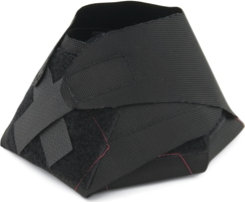Vesicular stomatitis (VS) is a viral disease that can affects horses and other live stock. It is an endemic disease in the warmer regions of North, Central, and South America, but outbreaks of the disease in other temperate geographic parts of the hemisphere occur sporadically.[1]
VS normally has an incubation period of two to eight days before the infected animal develops blisters that swell and burst, leaving painful sores. The virus can be transmitted through direct contact with infected animals or by blood feeding insects. Infected animals also can spread the virus when their saliva or the fluid from ruptured blisters contaminates feed, water or hay shared with herd mates. Sick animals should be isolated and may need supportive care to prevent a secondary infection where blisters have broken. Painful lesions also can form around animals’ hooves, resulting in temporary lameness.[1]
People handling sick animals should wear rubber or latex gloves as a biosecurity measure to prevent the spread of disease to other animals, or to themselves. In rare instances, humans can contract VS and develop a flu-like illness that lasts four to seven days.[1]
When a producer or private veterinary practitioner reports that an animal has blisters, erosions or sores, Texas Animal Health Commission (TAHC) or U.S. Department of Agriculture (USDA) veterinarians, trained as foreign animal disease diagnosticians, will assist in the disease investigation. They will work with the owner’s private veterinary practitioner at no charge to take a health history and ask questions about the animals’ recent movements to and from the premises. Finally, blood samples, swabs and/or tiny snippets of tissue will be collected from the blisters or sores on the affected animals. The samples will be packaged and shipped to the appropriate laboratory for testing at no cost to owners. Most results are reported in two or three days, but virus isolation testing may require up to 14 days.[1]
In the meantime, all animals on the affected premises will be placed under a hold order by the TAHC to stop animal movement as a measure to protect against the spread of disease. It is vitally important that livestock owners report potential cases of VS, so that samples can be collected and tested to confirm VS and rule out other diseases. If VS is confirmed, infected animals are quarantined for 21 days after all lesions are healed.[1]
[1] - Texas Animal Health Commission Brochure on Vesicular Stomatitis
The Texas Animal Health Commission (TAHC) received confirmation of eight new cases of Vesicular Stomatitis (VS) in horses in Central Texas. Five new premises are located in Travis County and three new premises are in Bastrop County:[2]
One premises is located 4 miles east of Webberville in Bastrop County
One premises is located 6 miles southeast of Spicewood in Travis County
One premises is located 8 miles northwest of Bastrop in Bastrop County
One premises is located 4 miles east of Webberville in Bastrop County
One premises is located 4 miles northwest of Webberville in Travis County
One premises is located 2 miles south of Garfield in Travis County
One premises is located 3.5 miles northwest of Webberville in Travis County
One premises is located 2.5 miles northwest of Webberville in Travis County
To date, 21 premises in eight Texas counties have been confirmed with VS. Affected counties include(d): Kinney, Hidalgo, San Patricio, Nueces, Jim Wells, Bastrop, Travis and Guadalupe counties. Four premises have been released from quarantine: 1 in Kinney county, 2 in Nueces county and 1 in San Patricio county.[2]
The newly identified infected premises are currently under quarantine by the TAHC. Affected horses will be monitored by regulatory veterinarians while under quarantine. Premises are eligible for quarantine release 21 days after all lesions have healed. There is no known exposure to other horses around the state, or at any equine events.[2]
[2] - TAHC Vesicular Stomatitis in Texas Update
Several states have provided the TAHC with information on enhanced entry requirements they are imposing on Texas livestock (including horses) due to the recently announced VS cases in Texas. For information about these movement restrictions, contact the state or country of destination and/or click on this link - 2014 State Restrictions.
For more information about VS, open and read the TAHC’s brochure on VS.
Go here for a fact sheet on Vesicular Stomatitis from the USDA-APHIS.
Click on this link to the USDA-APHIS for current national VS situation reports.
To locate your local TAHC regional office, click here.



















No comments:
Post a Comment